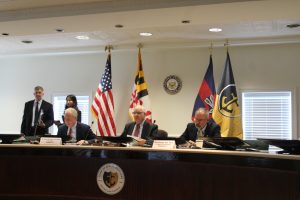
Senators Chris Van Hollen and Ben Cardin are joined by Rep. Andy Harris for a field hearing on small business needs in rural communities.
By Cindy Hoffman, Staff Writer
(Aug. 24, 2023) The Town of Berlin is home to 5,000 residents and 250 businesses. So, it’s no wonder that Maryland Senators Ben Cardin and Chris Van Hollen chose it as the site to host a field hearing for the U.S. Senate Committee on Small Business and Entrepreneurship at the council chambers on Thursday.
The focus of the hearing was “Small Business Resiliency: Learning to succeed in America’s dynamic economy.” The hearing was chaired by Senator Ben Cardin.
Mayor Zack Tyndall welcomed the senators and Congressman Andy Harris to town. Prior to the hearing, they took a stroll through Berlin to meet with several small business owners.
Tyndall said Berlin may be thriving today as a great place to work and live, but that was not always the case.
Cardin noted that rural areas have faced significant challenges over the past few years, including covid19, natural disasters, internet connectivity, access to a trained workforce and lack of capital.
“We are here to help,” he said.
The senators and Harris heard testimony from business owners and economic development professionals from the Eastern Shore during the hearing, including Roxanne Wolf, the program director of Shore Gourmet, Nick Hargrove of Wittman Wharf Seafood, Cassandra Vanhooser, the director of the Department of Economic Development and Tourism for Talbot County and Rick Loeffler, a business consultant for Maryland Small Business Development Center Network.
During her testimony, Vanhooser highlighted the development of the Eastern Shore Economic Resiliency Toolkit, which was drafted during the pandemic, but was created to address any economic upheaval. The toolkit provides data exploration tools to help the region recover from economic shock and build additional resiliency against future disruptions.
Ideas and case studies were shared by Wolf for turning vacant poultry houses into profitable micro farms for specialty herbs and nutraceuticals, products derived from food sources that provide both nutrition and medicinal benefits.
Her company has developed a bacterial abatement protocol with the University of Delaware and VerLina in Ridgely, Maryland to safely convert poultry houses into growing environments.
“Farmers need help in changing their business model to diversify and bring innovation and technology into their farms,” Wolf said.
Hargrove shared his experience turning an oyster house into a USDA certified blue catfish processing facility to harvest this invasive fish that is harming the local blue crab population and thus the fishing industry.
Today, he processes 15,000 lbs. of fish a day.
While that is a lot of fish, Hargove said he needs equipment that can ramp up production so he can meet the demands of his customers and allow him to hire more employees as well as help save the bay ecosystem and crab population.
“We have been able to keep the price of the fish high and stable, ensuring that the fishermen get fair prices for their catch and compensated for their hard work,” Hargrove said.
Each speaker provided recommendations for ways Congress could help rural businesses survive and thrive.
Loeffler suggested developing a rural loan product that is based on the covid-era Economic Injury Disaster Loan Program, to support greater resilience for businesses that need to develop a pivot strategy, especially for smaller businesses.
Hargrove gave recommendations that would assist the crab and fishing industries in Maryland.
He called for a tax or tariff on foreign crab meat with the proceeds going back to rebuild aquatic habitat and help combat the predation caused by invasive species including blue catfish, cownose rays and snakeheads.
He also suggested putting blue catfish into its own category, since now they are in the same regulatory category as farm-raised fish.
Wild blue catfish do not have salmonella like farm raised fish do, and therefore do not need more vigorous regulations to ensure a safe product goes to market.
“If we don’t, we are going to be known as the Chesapeake Bay, home of the blue catfish, not Chesapeake Bay, home of the blue crab.”
Wolf pitched the idea of branding Maryland products, similar to Wisconsin Cheese and Maine blueberries that consumers look to purchase.
Many of these products, such as nutraceutical herbs, mushrooms and algae are coming from overseas with questionable growing practices, Wolf said.
“Consumers prefer domestic and local,” Wolf said.
“We need programs that allow businesses to grow and prosper, even during times of uncertainty, and your commitment through funding that provides the resources and the flexibility for local jurisdictions to implement programs that help small businesses thrive,” Vanhooser said.
In closing Cardin recognized the need to pass laws to update the nation’s visa program to address the need for seasonal workers on the Eastern Shore as well as to recruit a more permanent workforce.
“We need to target better to help rural Americans,” Cardin said.
